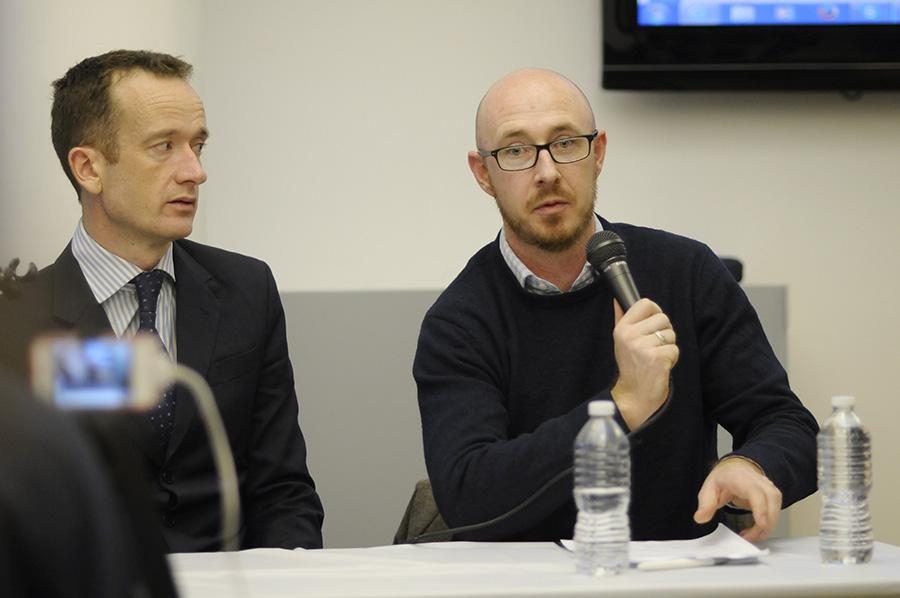HRW report reveals continued violations
Nicholas McGeenan, left, and Sean O’Driscoll speak on the release of the new Human Rights Watch report.
February 11, 2015
Human Rights Watch published a report on Tuesday highlighting the continued violations of labor rights on Saadiyat Island, including NYU Abu Dhabi’s campus. The report said NYU failed to enforce and monitor treatment of migrant workers.
The NYU Coalition for Labor hosted a panel on Tuesday at the Department of Social and Cultural Analysis of Abu Dhabi researchers, including Nicholas McGeehan and Sarah Leah Whitson, co-writers of the Human Rights Watch report; Sean O’Driscoll, an independent journalist who wrote articles about Abu Dhabi in The Guardian and The New York Times and Vasuki Nesiah, academic director of the Gallatin Global Fellowship in Human Rights.
McGeehan said he was shocked to find out NYU was involved in human rights violations in the United Arab Emirates. He referenced a New York Times article written by O’Driscoll and reporter Ariel Kaminer that uncovered the harsh living and working conditions of migrant construction workers for NYU.
“The most disturbing violation of rights that we documented was the mass of arbitrary deportation of two groups of workers,” McGeehan said. “The one we documented in most detail was the one that was first exposed by The New York Times in a piece that Sean and his coworker wrote.”
Kaminer said the UAE funded a lot of the campus’ construction cost, and even pocketed money from the erection of the new campus.
“I think we’re forgetting a potentially big piece of that puzzle, which is that NYU got a huge signing bonus and the administration has not said, hasn’t confirmed what the actual amount is,” Kaminer said. “They agreed that it was more than $50 million and that was widely understood to be just the first of a series of payments of undisclosed amounts.”
After workers spoke out about working conditions, O’Driscoll said they were identified and targeted by officers in balaclavas.
“They ordered all of the workers out of the camp and anybody who didn’t come downstairs, meanwhile a lot of the night workers were asleep, they went door to door kicking doors down dragging workers out, chasing them down the stairs,” O’Driscoll said. “It’s hard to believe, when I listen to some of the workers’ stories that these were NYU workers, because NYU is supposed to set a high standard not just with the UAE but with the Gulf.”
NYU spokesperson John Beckman said the university took action to correct the human rights violations.
“The allegations contained in HRW’s report were also the subject of media reports last year, Beckman said. “Those reports led to the appointment last June of Nardello & Co., an international investigations firm, whose comprehensive review is expected to be completed and published this spring.”
Kristina Bogos, CAS senior, is the student leader for the NYU Coalition for Labor and investigated the human rights violations herself while studying abroad in Abu Dhabi.
“After studying abroad in Abu Dhabi for five months, right around when Sean’s piece in The Guardian came out that documented scant wages and living conditions of migrant workers, and I felt compelled to see what was going on firsthand,” Bogos said. “I talked to some of the workers, and I was shocked because it was only a 20 minute cab ride away.”
O’Driscoll said many faculty members at NYUAD have been defensive of the university in response to the attacks in the media.
“For some of those in NYU Abu Dhabi, it’s an attack on their pride,” O’Driscoll said. “They seem to look at it from purely this New York University perspective that this is an attack on Sexton or that it’s this faculty against that faculty. It’s got nothing to do with NYU’s faculty, it’s about people who have been beaten senselessly.”
Whitson said, contrary to popular belief, conditions in the UAE have gotten worse since NYU constructed the new campus.
“There was actually greater space for media freedom 10 years ago than there is today,” Whitson said. “Things are not getting better in the UAE because NYU is there now. In fact, there is a shrinking space for freedom of expression.”
Disclaimer: Kristina Bogos is a former features editor.
A version of this article appeared in the Wednesday, Feb. 11 print edition. Email Alanna Bayarin at [email protected].
























































































































































